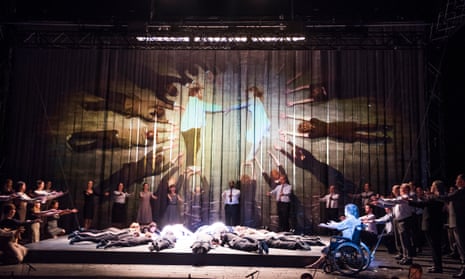On Friday, the chorus of English National Opera were on stage in front of more than 2,000 people as part of an exhilarating opening night of Mozart’s The Magic Flute. On Monday they performed a two-minute Gilbert and Sullivan song for a tiny audience of journalists. But it is the latter which may, in the long run, prove the most important.
The 44-strong chorus sang Hail Poetry from The Pirates of Penzance to launch their campaign to save wages, jobs and, in their eyes, the very future of ENO.
Their union, Equity, announced it was balloting the choristers on industrial action, up to and including strikes, after the company said it wanted to make four redundancies and negotiate a pay cut of least 25% in a battle to remodel the business and cut costs.
Hilary Hadley, the union’s head of live performance, said the dispute was about more than the wages and job security of its members because the proposals amounted to “cultural vandalism” that she said would push the opera company into terminal decline.
She added: “We do feel the proposals put forward to us, although probably well meant, actually are going to destroy English National Opera once and for all.”
Stephen Spence, Equity’s assistant general secretary, said the ballot was about trying “to retain the artistic integrity of English National Opera … Our concern is that a full-time ensemble on part-time pay is unsustainable.”
ENO has said it has no choice but to make savings after Arts Council England (ACE) cut its subsidy by £5m a year.
But the union argued the chorus is one of ENO’s great strengths. The “complex” deal on the table would result in four job losses and a 25% pay cut that, with the removal of add-ons such as overtime and Sunday working, could amount to 39%.
The strike ballot is the latest problem in what have been tumultuous times for the almost continuously beleaguered opera company. In the last year it has lost a chairman, an executive director and an artistic director and it is expected to announce in April a significantly truncated season as it tries to cut costs and increase revenues.
It also remains in special funding measures, having been removed from ACE’s national portfolio last year because of concerns over its governance.
Members of the chorus are contractually not allowed to talk to the press, but two spoke to the Guardian on condition of anonymity.
They said the last thing they wanted to do was harm ENO but that the threatened pay cuts would sacrifice quality.
“We would lose our best choristers,” said one. “This chorus has not been created, it has evolved over time. We know each other, we trust each other, we have a unique combination of voices … the ENO chorus is instantly recognisable.”
The other singer said it was “criminal” that no artistic director had been appointed since John Berry’s resignation. “The management have not got the artistic experience to inflict this … they don’t have the knowledge or love of the art form to understand. It is artistic vandalism.”
Before the press conference, ENO’s chief executive, Cressida Pollock, who was previously a McKinsey consultant, posted a blog outlining why the company was having to remodel its business to weather ACE’s cut.
“ENO is a solvent company and will remain that way,” she said. “To place the company at threat of another financial crisis would be to risk the future of one of the UK’s greatest cultural assets.”
She said reducing productions at the Coliseum was a temporary measure “and by 2020, we envisage producing 10 large-scale productions on the main stage ... and a further six around London or outside, including a full repertoire”.
The ENO has been assailed by some of the biggest names in opera including the Royal Opera House’s music director, Antonio Pappano, who warned of the company inflicting “irreparable damage” on itself.
A Save English National Opera petition set up last week had more than 3,000 signatures by Monday afternoon. They included that of mezzo-soprano Sarah Connolly, who wrote: “You cannot rip the heart out of an already wounded company and expect it to somehow provide successful productions where everyone knows what to do.”
The tenor Stuart Skelton wrote: “If poor decisions over time have been made that have led to this, why is it that the only group in the company who are utterly blameless for the bad decisions are the only ones to be punished?”
The ballot will consider a number of forms of industrial action, but a strike would not be unprecedented. In 2003, performances were halted after chorus members voted on strike action in similar circumstances.
Then, ENO got back on track after an emergency Arts Council rescue package – something no one expects this time.
ENO has now advertised for an artistic director, with a closing date of 17 February, and said it was “in the early stages of establishing a new artistic vision both at the Coliseum and in partnerships around London and the UK”.
ENO has been going through something of a golden period on stage. The Guardian’s Martin Kettle called its newly revived The Magic Flute “exhilarating” with “fine work” by the chorus.
No one disputes that ENO does need to raise more money which is why it has plans to generate more income with more bars and restaurants; and stage more musicals which began last year with Sweeney Todd and will continue in April with Glenn Close in Sunset Boulevard.
Equity say choristers are paid £32,900 and would find it difficult to continue living in London if they lost so much of their salary.
Hadley insisted the union understood ENO needed to cut costs. She said: “We are absolutely committed to working with them to achieve substantial savings. But we are not prepared to cross the line of making some savings and destroying the integrity of the chorus.”

Comments (…)
Sign in or create your Guardian account to join the discussion